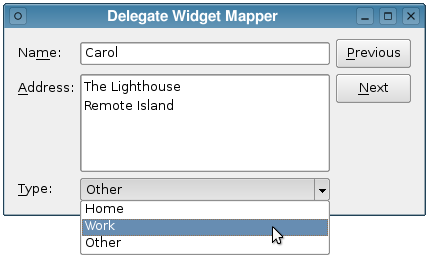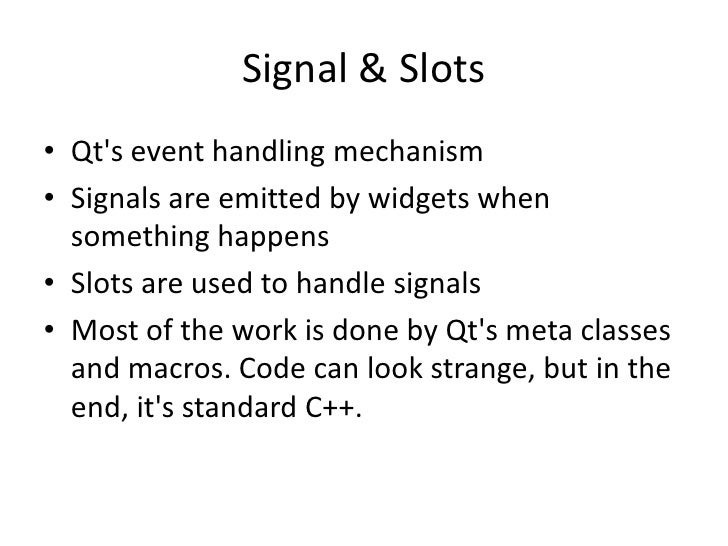Qt Slot Map()
In contrast to the previous example, our new class also uses a return value for the increment slot. No further adjustments are required to receive the return value in QML. Qt automatically maps basic C types to QML types for all method parameters and return values.
- C Tutorial: Attempts to make a connection to host on the specified port and return immediately. Any connection or pending connection is closed immediately, and Q3Socket goes into the HostLookup state.
- # First a generic Map Tool class NewMapTool (QgsMapToolEmitPoint): # Define the custom signal this map tool will have # Always needs to be implemented as a class attributes like this canvasClicked = pyqtSignal ('QgsPointXY') def init (self, canvas): super (self, QgsMapTool). init (self, canvas) #. And so on # This is the event triggered when the mouse button is released over the map.
- Maps SDK for QT. Fast-loading maps, functional online or offline. Turn-by-turn navigation using our Directions API with accurate live traffic. Fully integrated in Qt’s Automotive Suite, switch to Plugins for GL JS with one line of code.
- I'm using Qt Creator 2.0.1 and I have a custom slot my QMainWindow. Now I have a pushbutton, which on clicked should call the custom slot on the main window. Can do in code yes, but can't do this with the signal-slot editor. When I open the signal-slot editor, I see the custom slot on the right but the entire set of slots are disabled.
EnArBgDeElEsFaFiFrHiHuItJaKnKoMsNlPlPtRuSqThTrUkZh
This page was used to describe the new signal and slot syntax during its development. The feature is now released with Qt 5.
- Differences between String-Based and Functor-Based Connections (Official documentation)
- Introduction (Woboq blog)
- Implementation Details (Woboq blog)
Note: This is in addition to the old string-based syntax which remains valid.
- 1Connecting in Qt 5
- 2Disconnecting in Qt 5
- 4Error reporting
- 5Open questions
Connecting in Qt 5
There are several ways to connect a signal in Qt 5.
Old syntax
Qt 5 continues to support the old string-based syntax for connecting signals and slots defined in a QObject or any class that inherits from QObject (including QWidget)
New: connecting to QObject member
Here's Qt 5's new way to connect two QObjects and pass non-string objects:
Pros
- Compile time check of the existence of the signals and slot, of the types, or if the Q_OBJECT is missing.
- Argument can be by typedefs or with different namespace specifier, and it works.
- Possibility to automatically cast the types if there is implicit conversion (e.g. from QString to QVariant)
- It is possible to connect to any member function of QObject, not only slots.
Cons
- More complicated syntax? (you need to specify the type of your object)
- Very complicated syntax in cases of overloads? (see below)
- Default arguments in slot is not supported anymore.
New: connecting to simple function
The new syntax can even connect to functions, not just QObjects:
Pros
- Can be used with std::bind:
- Can be used with C++11 lambda expressions:
Cons
- There is no automatic disconnection when the 'receiver' is destroyed because it's a functor with no QObject. However, since 5.2 there is an overload which adds a 'context object'. When that object is destroyed, the connection is broken (the context is also used for the thread affinity: the lambda will be called in the thread of the event loop of the object used as context).
Disconnecting in Qt 5

As you might expect, there are some changes in how connections can be terminated in Qt 5, too.
Old way
You can disconnect in the old way (using SIGNAL, SLOT) but only if
- You connected using the old way, or
- If you want to disconnect all the slots from a given signal using wild card character
Symetric to the function pointer one
Only works if you connected with the symmetric call, with function pointers (Or you can also use 0 for wild card)In particular, does not work with static function, functors or lambda functions.
New way using QMetaObject::Connection
Works in all cases, including lambda functions or functors.
Asynchronous made easier

With C++11 it is possible to keep the code inline
Here's a QDialog without re-entering the eventloop, and keeping the code where it belongs:
Another example using QHttpServer : http://pastebin.com/pfbTMqUm
Error reporting
Tested with GCC.
Fortunately, IDEs like Qt Creator simplifies the function naming
Missing Q_OBJECT in class definition
Type mismatch
Open questions
Default arguments in slot
If you have code like this:
Qt Signal Slot Mapper
The old method allows you to connect that slot to a signal that does not have arguments.But I cannot know with template code if a function has default arguments or not.So this feature is disabled.
There was an implementation that falls back to the old method if there are more arguments in the slot than in the signal.This however is quite inconsistent, since the old method does not perform type-checking or type conversion. It was removed from the patch that has been merged.
Overload
As you might see in the example above, connecting to QAbstractSocket::error is not really beautiful since error has an overload, and taking the address of an overloaded function requires explicit casting, e.g. a connection that previously was made as follows:
connect(mySpinBox, SIGNAL(valueChanged(int)), mySlider, SLOT(setValue(int));
cannot be simply converted to:
...because QSpinBox has two signals named valueChanged() with different arguments. Instead, the new code needs to be:
Unfortunately, using an explicit cast here allows several types of errors to slip past the compiler. Adding a temporary variable assignment preserves these compile-time checks:
Some macro could help (with C++11 or typeof extensions). A template based solution was introduced in Qt 5.7: qOverload
The best thing is probably to recommend not to overload signals or slots …
… but we have been adding overloads in past minor releases of Qt because taking the address of a function was not a use case we support. But now this would be impossible without breaking the source compatibility.
Disconnect
Should QMetaObject::Connection have a disconnect() function?
The other problem is that there is no automatic disconnection for some object in the closure if we use the syntax that takes a closure.One could add a list of objects in the disconnection, or a new function like QMetaObject::Connection::require
Callbacks
Function such as QHostInfo::lookupHost or QTimer::singleShot or QFileDialog::open take a QObject receiver and char* slot.This does not work for the new method.If one wants to do callback C++ way, one should use std::functionBut we cannot use STL types in our ABI, so a QFunction should be done to copy std::function.In any case, this is irrelevant for QObject connections.
Qt Slot Map
Qt5 alpha has been released. One of the features which I have been working on is a new syntax for signals and slot.This blog entry will present it.
Here is how you would connect a signal to a slot:
What really happens behind the scenes is that the SIGNAL and SLOT macros will convert their argument to a string. Then QObject::connect() will compare those strings with the introspection data collected by the moc tool.
What's the problem with this syntax?
While working fine in general, we can identify some issues:
- No compile time check: All the checks are done at run-time by parsing the strings. That means if you do a typo in the name of the signal or the slot, it will compile but the connection will not be made, and you will only notice a warning in the standard output.
- Since it operates on the strings, the type names of the slot must match exactly the ones of the signal. And they also need to be the same in the header and in the connect statement. This means it won't work nicely if you want to use
typedefor namespaces
In the upcoming Qt5, an alternative syntax exist. The former syntax will still work. But you can now also use this new way of connecting your signals to your slots:
Which one is the more beautiful is a matter of taste. One can quickly get used to the new syntax.
So apart from the aesthetic point of view, let us go over some of the things that it brings us:
Compile-time checking
You will get a compiler error if you misspelled the signal or slot name, or if the arguments of your slot do not match those from the signal.
This might save you some time while you are doing some re-factoring and change the name or arguments of signals or slots.
An effort has been made, using static_assert to get nice compile errors if the arguments do not match or of you miss a Q_OBJECT
Arguments automatic type conversion

Not only you can now use typedef or namespaces properly, but you can also connect signalsto slots that take arguments of different types if an implicit conversion is possible
In the following example, we connect a signal that has a QString as a parameter to a slot that takes a QVariant. It works because QVariant has an implicit constructor that takes a QString
Connecting to any function
As you might have seen in the previous example, the slot was just declared as publicand not as slot. Qt will indeed call directly the function pointer of the slot, andwill not need moc introspection anymore. (It still needs it for the signal)
But what we can also do is connecting to any function or functor:
This can become very powerful when you associate that with boost or tr1::bind.
C++11 lambda expressions
Everything documented here works with the plain old C++98. But if you use compiler that supportsC++11, I really recommend you to use some of the language's new features.Lambda expressions are supportedby at least MSVC 2010, GCC 4.5, clang 3.1. For the last two, you need to pass -std=c++0x asa flag.
You can then write code like:

This allows you to write asynchronous code very easily.
Qt Slot Mapper
Update: Also have a look what other C++11 features Qt5 offers.
It is time to try it out. Check out the alpha and start playing. Don't hesistate to report bugs.